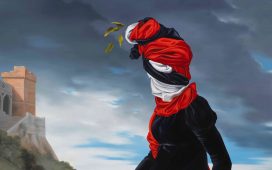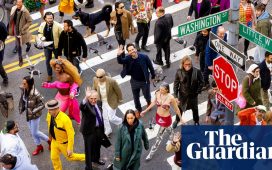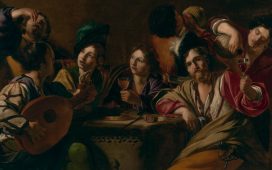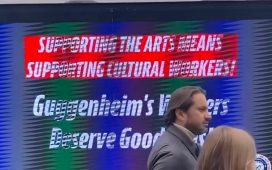British auction house executives were unable to obtain visas to travel to New York
There were hopes that some semblance of normality would return to Sotheby’s and Christie’s marquee sales in New York this week, with star auctioneers based in London taking to the rostrum in person rather than remotely. But, with a travel ban between the UK and the US still in place, a number of British auction house executives were unable to obtain visas to travel.
With Sotheby’s European chairman Oliver Barker among those whose visa was denied, the auction house is plumping for a hybrid model and will take sales remotely. In a bid to inject some theatrics into the proceedings, Sotheby’s has employed David Korins, who created the sets for the musical Hamilton, to design the saleroom. A spokeswoman says: “There will be up to 50 people in the auction room, with an auxiliary auctioneer, Quig Bruning, taking their bids and relaying them to Oliver Barker. It’s the most people we’ve had in the room since the pandemic began, and the art will be shown on the turntable like in the old days, so the sale should feel more like a real hybrid.” Phone bids are being taken by specialists in New York, Hong Kong and London.
Christie’s marquee sale on Tuesday night was live streamed from its New York salesroom
Meanwhile, Christie’s plans appeared to be up in the air till the very last minute. Gemma Sudlow, Christie’s senior vice-president, took their 21st-century sale on Tuesday night, while chairman of global private sales, Adrien Meyer, is on the rostrum for the 20th-century auction on Thursday. Both are based in New York.
A Christie’s spokeswoman could not confirm whether any of the auction house’s London-based executives had been denied visas, though star auctioneer and global president Jussi Pylkkanen was notably absent in New York. Christie’s Paris-based chief executive, Guillaume Cerutti, was in attendance.
Tuesday’s sale, which grossed a strong $210.5m with fees, was livestreamed from Christie’s New York saleroom with several specialists in the room, plus phone bidders beamed in from London and Hong Kong. Appetite to see art in the flesh is voracious, if Christie’s footfall is anything to go by. The spokeswoman says the firm has had more traffic through its Rock Center galleries in the past five days than it has in more than a year. “Overseas clients who haven’t yet been able to travel to New York are using our digital tools and FaceTime views with our specialists to see all of the works on offer,” she adds. “Based on tracking our last few major sales in New York, we’ve found 50-60% of lots are purchased without the buyer having seen the work in person.”
British dealers were also notably absent from Frieze New York last week, though some found creative ways of having a presence in the city even if they could not be there in person. In addition to doing the fair, the London dealer Stephen Friedman is hosting a two week pop-up group show of gallery artists at Crozier in Chelsea. None of his staff could obtain a visa, so Friedman hired the dealer Allison Card, a director at the esteemed New York gallery Metro Pictures for 20 years, to oversee his New York projects.
With a strong collector base in North America, Friedman felt it imperative to show the new work his artists have been creating during lockdown “in the flesh”. Fair-tigue used to be the problem, “now collectors talk of OVR-tigue”, he adds. The gesture has not gone unnoticed, with US collectors responding “very positively”, Friedman says. Satellite projects manned by others may even be here to stay. As Friedman puts it: “This is a bit of a litmus test for us. So far, we’re very happy with the results. Going forward, we will probably find a way to integrate this into the way we engage with our clients.”









